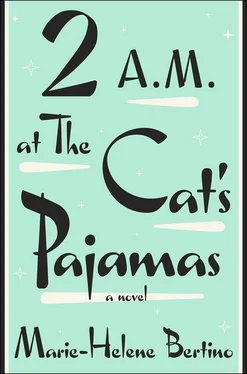“Okay,” she nods.
He is surprised by how much this pleases him. “Back up!” he announces. He positions Sarina on the bottom step. He attempts to lean against the pillar but his foot finds no ground. He has forgotten the two steps leading up to the porch. He falls up. One leg vaults out in front of him; the other, bent at the knee, follows. Unsupported by either leg, arms thrown back toward Sarina’s door, he forms a four-pointed star in the air. He lands gracelessly, elbow hitting the hard steps before the back of his head, calves, ass. He sees white then gray then white. In the air hangs the smell of wet roses, but that can’t be, it’s the wrong season. Sarina is behind a thick pane of glass cheering for him as he swims underwater. What is she saying? She cheers: Ben! Ben! He wants to answer but his mouth is filled with tin and chalk. He manages a sitting position on the ground, gravel sticking to his palms. “Give me a minute. I think I need to do this.” He places his head between his knees.
“Your hand is bleeding.” Sarina encircles his wrist and shows him his own injury. “I’m getting a towel.” She disappears inside her apartment.
Ben dabs at his lip. “Quite a show, huh?”
The little girl shifts from foot to foot. “I’ve seen worse.”
“I’m sorry about the apples,” he says. “And the lice. It doesn’t seem fair.”
“Life’s not fair,” she says.
“Tush,” he says. “The world is much more interesting than that. Sometimes, of course, it’s not fair. But sometimes it’s very fair, overly fair, so fair that you want to throw up from all the fairness. Then it goes back to being unfair. The world is cyclical.” He shakes a cigarette from his pack. “Do you mind?”
“Can I have one?”
“She”—he jerks a thumb toward the door—“would throttle me.” He smokes. He checks; Sarina is still inside. “One drag.”
The girl inhales and hands the cigarette back. “Do you know about The Cat’s Pajamas?”
This is what Sarina passes as she hurries toward the kitchen: a sofa with stray glitter collected in its folds, a smattering of Popsicle sticks, a CD of songs with the word home in them, a guide to making killer martinis, dark chocolate, darker chocolate, a life-size model of a heart, and an almost-finished painting on her easel. In it a man strides halfway out the front door of a common-looking family room. The viewer cannot see his face: his attention is turned toward a farther room where a boy lurks in a doorway. Half of the man’s head is flayed, the skin collected in uniform curlicues at the base of his neck. The elements of his brain, each lobe and gland, are rendered in meticulous detail. His neck and arms are whole, but his torso is also stripped, revealing the heart’s tender ventricles. They tumble out of the body and wind around the bank of tulips on the porch, reach toward the boy. Other canvases stacked against the wall depict similar scenes of people and animals whose interior workings are on display. An older couple walks a transparent dog in the park. An excoriated bus driver turns the enormous, flat wheel of a bus.
Sarina dampens a dish towel and trills past everything again on her way outside, where Ben sits smoking on the step that tried to delete him. She helps him arrange the ice cubes around his elbow. “I think you should go inside, Madeleine. I will see you in school next week.”
“No,” Madeleine says. “You won’t.”
“I’m sorry, but we can talk in the morning.”
“Fine.” Madeleine hoists one leg over the windowsill then the other. “Later, skaters.” The sash snaps shut.
“Your neighborhood is much more exciting than mine,” Ben says. They sit on the stoop. Sarina imagines millions of white blood cells attending to Ben’s elbow, repairing thin tissue with screws and glue. “I want to dance,” she admits.
“There is a place,” Ben says. “It’s very special. It’s called The Cat’s Pajamas.”
Sarina laughs. “You want to DONCE with Marcos?”
“Why not?”
“How’s your bleeding?”
Ben holds his wrist to his ear as if checking a watch. “How are you doing, bleeding?” He waits for an answer. “Stopped,” he says. “Ready to walk.”
Behind her curtains , Madeleine eavesdrops. She hears Miss Greene and Ben say they will go to The Cat’s Pajamas. This starts the engine of her heart. It triple-time steps, heel drop, hit. Pas de bourrée. Pas de bourrée.
Madeleine watches them arrange their coats and scarves, getting ready to leave. She weighs several options in the time it takes to cinch a knot.
She could open the window and scream: Take me with you!
She could do nothing.
She could follow them.
She could unload a sleeve of crackers into her mouth.
A voice in her mind says: Junk that jazz book, go to bed, get your GED, marry early, have a child. Bury your useless pipes inside you in a box labeled: never open. Everyone will say, what a wise and rational girl you turned out to be. So different from your nutso mother .
Madeleine closes her eyes and plucks a random card from her mother’s recipe box.
DO WHAT SCARES YOU.
She flips it over. On the other side, her mother has printed: BRING A SCARF.
Miss Greene and Ben have disappeared beyond the archway. Madeleine wraps her scarf and coat around her, throws open the sash, and with a final look back into the warm square of her bedroom, clears the sill in one leap.
It has been quite a fucking day for Ted Stempel, and it’s not over yet. His girlfriend has advised him she will be arriving at the store within minutes and when she does, he’d better be ready to explain. The fact that her first name is Delilah makes her last name unnecessary.
Today, Ted was supposed to help transition Delilah’s grandmother from one nursing home to another. It would have required packing up the old woman’s knickknacks and unmentionables at the first home, along with paperwork, niceties, maneuvering the dazed woman down the corridor into his car, taking care that none of her sagging limbs got caught in the seat belt, a ten-minute ride to the new home where, Delilah says, they don’t let you sit in your own filth all day, more paperwork, niceties, knickknacks arranged on a new bureau.
Only, Ted Stempel doesn’t do any of that. He tells Delilah he must work all day at the store, open twenty-four hours and owned by his wife, Kendra, who is famous for her ability to make gravy out of, like, nothing. He sleeps until noon, then walks his true love, Malcolm, a broad-shouldered pit bull puppy who has never once asked Ted to explain himself. Walking a pit bull has the surprising effect of eliminating Ted’s need to engage in niceties. This is one of many reasons Ted would for Malcolm take a Louisville Slugger to the balls.
Here is Ted on South Street around three P.M., holding an extra-large hot chocolate. His brilliant boy struts next to him in his best sweater, the color of grass. Every so often, Malcolm peers up the leash to confirm that Ted is still there. Ted asks Malcolm if he is in fact the most handsome dog in the world and, without waiting for the dog’s reply, assures him that yes, he is. Ted admires a window display that showcases a new Harley-Davidson and imagines motoring down the California coast wearing mirrored sunglasses. Daydreaming, he doesn’t see the Rottweiler a block away ridding itself of its leash and barreling toward them. Ted feels an upsetting jolt at his side as the Rottweiler clamps down on Malcolm’s neck and lifts him above the ground.
The young blond dog owner, screaming. A horrified parade of passersby. Ted, blinking, tries to understand the scene in front of him, as Malcolm is tossed back and forth in his perfect sweater.
Читать дальше












